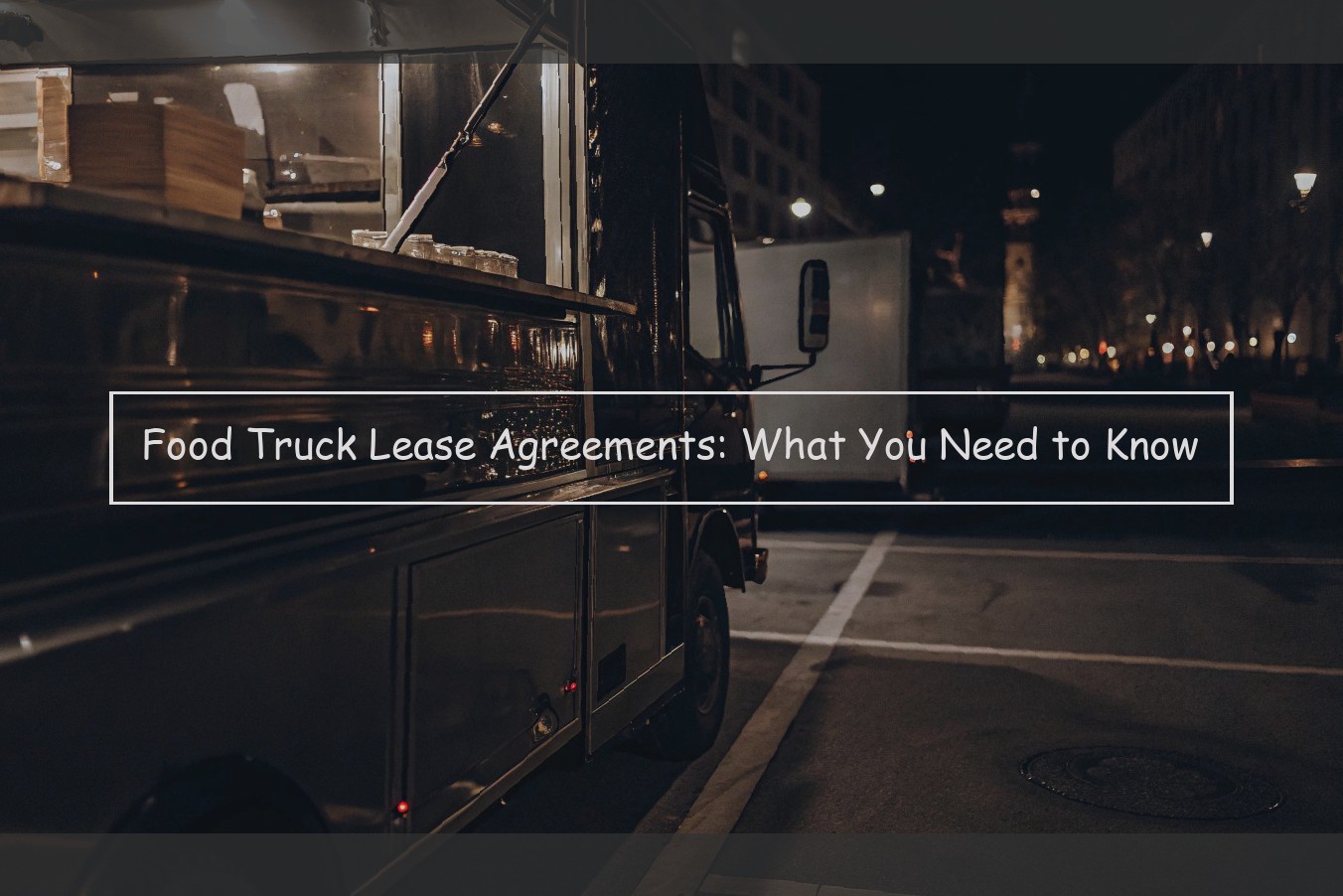
What is a Food Truck Lease Agreement?
In simple terms, a food truck lease agreement is a legal document between an owner of a food and/or beverage truck and a lessee (tenant) that allows them to operate a food business within the confines of that vehicle. Like other commercial leases, this document will not only provide the parties’ and their respective roles and duties, but also how to terminate your relationship. It is far more complicated than simply setting out who has to pay what to whom.
When a food truck operator enters into a lease agreement with a food truck owner, it covers many important aspects. It identifies the parties to the lease , the subject matter (the vehicle) and the term of the lease. This term can last for a number of months to several years, which is to be expected as equipment and vehicle costs can be tens of thousands of dollars.
The agreement should provide for the rent amount, when rent is due, when late fees are incurred, and perhaps a performance bonus of sorts, where the operator pays more when the business does well. Of course, a deposit will also be required, along with whether there is any early termination rights. It is so vital that everyone involved understands what they are getting into via this food truck lease agreement, as it is so much more than merely paying monthly rent.
Food Truck Lease Agreement: Key Terms
As with any commercial lease, the most important thing to remember about food truck lease agreements is that they are contracts, and you should review them like any other contract. The lease agreement should address the following:
- (1) A stated lease term. This can be set for a specific number of months or years, or it can be on a month to month or week to week basis. Even if the stated term is for a number of months or years, be sure you know what happens if you do not renew. For example, does the landlord have a right to terminate at any time? Or, do you?
- (2) Rental costs. While the majority of rental agreements for food carts and trucks are for a fixed amount, there are also many that are a percentage rental relationship. In addition to a flat monthly amount, you may be required to pay a percentage of gross sales. Be careful about agreeing to percentage rent provisions for something like a coffee truck or cart, where you are buying the product and reselling it at a marked up price. If you are only adding five to ten cents per cup, that profit margin will make a difference in terms of the rental amount.
- (3) Permitted use. This is an important section and should be well thought out. For example, if you are in the business of catering, and agree to a lease with a landlord offering only sales to walk-up customers, you will likely find yourself negotiating for months to no avail. Once you sign on the dotted line, you will have lost a significant degree of leverage, and it will set the tone of the relationship to come.
- (4) Maintenance obligations. It is important to have a clear understanding from the outset of the lease who is responsible for maintenance of things like plumbing and power sources. For example, if you plan to plug into an electrical outlet, will you be responsible for the cost of maintenance, or will the landlord be responsible?
Types of Food Truck Lease Agreements
Full-Service or Modified Gross Lease
A full-service or modified gross lease is the most common type of food truck lease. In this arrangement, the lessor provides the food truck and/or trailer, and the lessee is responsible for leasing space inside the truck and/or trailer, as well as utility connections and any permits that may be required. The lease also typically states that the truck and/or trailer must be parked in the same location periodically or during specified hours of the day, thus reserving that space as the leased area for the food truck to operate. This type of lease arrangement is often entered into for one year and is more expensive than other arrangements.
Triple Net Lease (NNN)
A triple net lease arrangement is another common type of lease structure for food trucks and trailers. A NNN lease requires the lessor to provide only the leased space and all utilities must be paid by the lessee, as well as property taxes and insurance. These fees are often incurred through escrow (or a similar process) each month, rather than on an annual basis, as is often the case with a full-service lease.
Land Leases
A land lease can be entered into with the owner of the parking lot where the food truck will operate. Much like a real estate lease, a land lease outlines the general rules regarding the use of the property, and it will include fees for occupancy, as well as any potential changes the lessee seeks to make to the parcel — modifications to existing structures, for example. A land lease is generally less expensive than the others described above, but, due to limited square footage, the food truck will often need to move to and from various locations each day or week.
Negotiating Your Food Truck Lease Agreement
The initial step in negotiating a commercial lease is determining what is necessary for the business to operate and future success. After determining the essential needs, the entrepreneur must analyze a number of common lease terms that are bargained in a food truck lease and think strategically before entering into an agreement. It is very tempting to sign the first lease presented but this does not always represent the best terms for everyone. The goal should be to construct a lease that provides stability while protecting the business and entrepreneurs long term.
Location is key to any food truck operation profitability. Many entrepreneurs may not fully appreciate the importance of location, however, in the food truck business, location is everything! Not all locations are created equal and certain locations may be significantly more profitable than others. Performing proper due diligence by learning about a particular location can prove beneficial.
Rent will often be the most significant expense that must be negotiated. Each location is unique and rent adjustments may vary depending on what year the business is in and what rental rate the business is currently paying. The first place to start is to see what other similar businesses are paying for rent. Once this is achieved, depending on the profit margins the business is making, the food truck business can negotiate for rental increases or reductions. For example, the business may want to negative annual rub adjustments to rate types including CPI (Consumer Price Index), INFL (Inflation), or RPI (Retail Price Index). However, some businesses may consider it better to allow for annual rub up adjustments in exchange for a lower base rental rate. An annual rub adjustment will allow the landlord to institute a slight increase every year. But if the business enjoys having its rent fixed in a long-term lease, then a rub up adjustment can be negotiated to offset the proposal. The key is to make sure the business is paying the fair market value rate for rent and hopefully have more flexibility in annually adjusting the rent.
Options for expansion of a food truck business should not be overlooked. Many entrepreneurs fail to understand the value of negotiating for expansion in the early stages of the business. It is difficult to predict the expansion of a business, but growth is almost always welcomed. To ensure that the entrepreneur has the ability to grow with the business, it can negotiate for expansion rights such as the right of first refusal to expand its footprint (if the business was successful enough to warrant a larger footprint). The right of first refusal allows a business to occupy vacant property in a particular area if and when the property becomes available.
Agreements regarding the term length(s) of a lease should also be carefully analyzed and negotiated. The length of the term could be determined based on several factors including the potential for renewal, rent increases, and the inability to sublease the space. Key considerations should include what term is necessary for the business to build itself up, if the business has any investment costs (remodeling, renovations, and improvements) and whether the business will be starting with an empty space or if it will begin with a completed building in which case the lease may need to be negotiated with regard to the finishes. Also consider if you would need to sublease the area based on the business or other potential uses for the area.
These are just some of the pointers that the entrepreneur should consider during the negotiation process. These suggestions are in no way the full laundry list of topics to be mindful of, but these should definitely be considered early on in the process.
Common Mistakes to Avoid in a Food Truck Lease Agreement
As is the case with any lease agreement, there are certain common mistakes food truck owners should avoid. Here’s some seasonal advice on potential red flags to watch out for: Fees. The first way lessor may get you is by charging extra fees which may disappear at the end of the year. These fees may not be named in the lease, but are tacked on to your monthly payments. Perhaps the lessor asks for a larger security deposit than is typical, or asks for larger property tax fees (which is unlikely since property taxes are public record). If the fees are named in the lease, they must be clearly outlined, and the lessor must obtain written approval from you before any charge over this later amount is made . Restrictive clauses. The lease should define how far away from the lot you can park your truck. In a lot of cities, the distances are strict and inflexible. Always clarify when the truck must be moved so you know what the restrictions are. No exit plan. There’s always a chance that the truck will break down, or that you want to move to another location after a season of operation. Be sure there are provisions in the lease that allow for those issues. A lease should also define the total length of your lease. A six month lease is much more manageable than a two year lease. Consider renewing on a yearly basis so you can make sure the location is a successful one before you sign a long-term lease.
Considerations When Leasing Food Truck Space
Considerations relating to leasing of food trucks are not just critical from a business perspective but must also comply with myriad municipal zoning laws, health regulations and licensing requirements that can differ from area to area.
Many states have established voluntary food truck licensing regulatory boards. As an example, New York State has created the Food Truck License Task Force currently comprised of representatives from New York’s Division of Food Safety and Inspection, the Division of Public Health’s Center for Environmental Health, the Department of Taxation and Finance, the Department of Motor Vehicles, the State Liquor Authority, the Division of Building Standards and Codes, and the Empire State Development. It is the interpretation of the various inspectors from the different state agencies that is the greatest problem and posses the greatest risk. Unison is in the process of creating formalized training for inspectors from the all of the various agencies to facilitate consistent understanding of the regulations governing food trucks so that inspectors and the food truck operators understand the requirements.
The legal framework governing food trucks includes city zoning laws that limit where food trucks can operate, which often faces strong opposition from restaurants. While some municipalities are friendly to food trucks as a means of promoting cities, others are not. Often the opposition from traditional businesses who may feel threatened is an unfair tactic by established businesses to eliminate competition from new, innovative businesses.
Ending a Food Truck Lease Agreement
When it comes to a lease on a food truck, the goodwill, value, and operations of the business are all wrapped up in the lease. It is for this reason why the parties need to be aware of how to properly terminate a food truck lease when the time comes, either voluntarily or involuntarily. Chicago commercial real estate attorney Timothy Hughes has assisted many clients with reviewing and negotiating food truck lease agreements.
Terminating the Lease Early
There are many reasons why you might have to terminate the lease early for your food truck. For instance, you may have reached an impasse with the truck owner over the price of the lease. Perhaps you have learned that the truck owner has defaulted on their financial obligations to the fleet owner.
Either way, the proper procedure will depend entirely on your situation. You should not decide to stop making lease payments or simply leave without the consent of the food truck owner. The first thing you should do is carefully read through your lease agreement. In many instances, there will be a section that is devoted to termination.
If you have a disagreement with the food truck owner, you could effectively bring yourself into a lawsuit if you choose to stop making lease payments. If the lease is binding until a certain date, you will likely be held to that lease unless you legally terminate it or the other party agrees to terminate the lease. Your best option is essentially to find a way to work through the issue with the other party. Many food truck fleets will try to help resolve the dispute.
Voluntary Termination
The goal here is to prevent claims against you for unpaid rent, lost profits, or damage to the food truck. In most cases, the food truck lease agreement will give you termination rights. You may not be required to provide advance notice.
The lease agreement could specify the conditions under which you could terminate. Breach of lease or inability to obtain the required permits are common conditions.
If you feel as though you need to terminate the lease agreement and the lease doesn’t give you the right to do so, it is possible to terminate at will. However, in order to successfully terminate such a lease, you need to have legal grounds to do so. As it relates to food truck leases, this is generally impossible. When the parties sign the lease agreement, they agree to its terms voluntarily and in good faith. This means that you forward cannot terminate the lease because you simply no longer desire to do so.
There are exceptions when it comes to terminating a lease at will, however. For instance, you may have the right to voluntarily terminate the lease agreement if the owner has failed to perform their obligations under the lease.
Involuntary Termination
Involuntary termination occurs when the court or other third party terminates the lease. Involuntary termination can occur based on the voluntary agreement between the parties. The lessor may attempt to terminate the lease agreement based on the lessor’s right to eject you from the property. A similar process occurs if the other tenant sues for a constructive eviction. A negative decision on the merits of the lawsuit may lead to the lease termination.
Termination of the lease early can come with a series of legal hurdles in the middle. The lawyers at Leavens, Strand & Glover, LLC have served many satisfied clients throughout the Chicago area.
Getting Help with Your Food Truck Lease Agreement
There are many ways to find assistance for drafting or reviewing your lease agreement. I always recommend starting with a lawyer and looking for one that works with food truck operators. You can also find industry associations that can help with your agreement or online resources and forums for finding and obtaining or reviewing a lease agreement. Do your research and if you don’t feel comfortable with a deal , ask for help.



